

The Aeneid: Character List. The Aeneid: Character List. Aeneas. Trojan hero in Greco-Roman mythology Etymology[edit] Aeneas is the Romanization of the Greek Αἰνείας (Aineías).
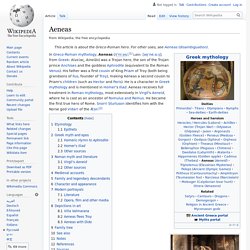
Aineías is first introduced in the Homeric Hymn to Aphrodite when Aphrodite gives him his name from the adjective αὶνóν (ainon, "terrible"), for the "terrible grief" (αὶνóν ἄχος) has caused her. [a][3] It is a popular etymology for the name, apparently exploited by Homer in the Iliad.[4] Later in the Medieval period there were writers who held that, because the Aeneid was written by a philosopher, it is meant to be read philosophically.[5] As such, in the "natural order", the meaning of Aeneas' name combines Greek ennos ("dweller") with demas ("body"), which becomes ennaios or "in-dweller"—i.e. as a god inhabiting a mortal body.[6] However, there is no certainty regarding the origin of his name.
Epithets[edit] Jupiter Indiges. The Greek historian Dionysius of Halicarnassus notes that when the body of Aeneas was not found after a battle between his group of Trojan exiles in Italy and the native Rutulians, it was assumed that he had been taken up by the gods to become a deity.
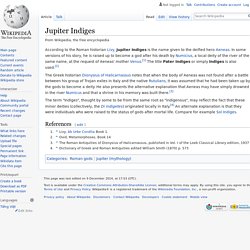
He also presents the alternative explanation that Aeneas may have simply drowned in the river Numicus and that a shrine in his memory was built there.[3] The term "Indiges", thought by some to be from the same root as "indigenous", may reflect the fact that these minor deities (collectively, the Di indigetes) originated locally in Italy.[4] An alternate explanation is that they were individuals who were raised to the status of gods after mortal life. Compare for example Sol Indiges. Numicus. Jump up ^ Titus Livius (translated by Rev.

Canon Roberts). The History of Rome, Everyman's Library (London: J. M. Dent and Sons, 1912), Book I, 2.Jump up ^ Ovid. Metamorphoses, Book 14. Anna Perenna. Anna Perenna was an old Roman deity of the circle or "ring" of the year, as the name (per annum) clearly indicates.
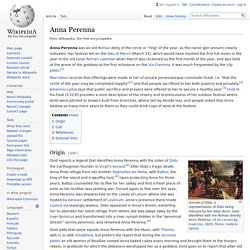
Her festival fell on the Ides of March (March 15), which would have marked the first full moon in the year in the old lunar Roman calendar when March was reckoned as the first month of the year, and was held at the grove of the goddess at the first milestone on the Via Flaminia. It was much frequented by the city plebs.[1] Macrobius records that offerings were made to her ut annare perannareque commode liceat, i.e.
Origin[edit] Ovid reports a legend that identifies Anna Perenna with the sister of Dido, the Carthaginian founder in Virgil's Aeneid.[4] After Dido's tragic death, Anna finds refuge from her brother Pygmalion on Malta, with Battus, the king of the island and a wealthy host.[4] Upon protecting Anna for three years, Battus counselled her to flee for her safety and find a fresh place of exile as her brother was seeking war. Cult[edit] References[edit] Lavinium. Gate into the interior of the settlement of the frazione of Pratica di Mare, a medieval walled village at the site of the center of ancient Lavinium.
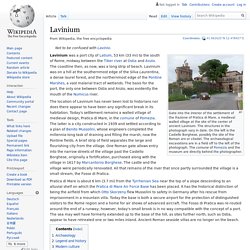
The structures in the photograph vary in date. On the left is the Castello Borghese, possibly the site of the Roman arx or citadel. The archaeological excavations are in a field off to the left of the photograph. The comune of Pomezia and the museum are directly behind the photographer. Lavinium was a port city of Latium, 53 km (33 mi) to the south of Rome, midway between the Tiber river at Ostia and Anzio. The location of Lavinium has never been lost to historians nor does there appear to have been any significant break in its habitation. Pratica di Mare is about 6 km (3.7 mi) from the Tyrrhenian Sea near the top of a slope descending to an alluvial shelf on which the Pratica di Mare Air Force Base has been placed.
Archaeology[edit] Amata. Ancient Roman mythological figure.

Etruscan civilization. Pre-Roman civilization of ancient Italy The Etruscan civilization () is the modern name given to a civilization of ancient Italy in the area corresponding roughly to Tuscany, western Umbria, northern Lazio,[1][2] with offshoots also to the north in the Po Valley, in the current Emilia-Romagna, south-eastern Lombardy and southern Veneto, and to the south, in some areas of Campania.[3] The earliest Etruscan inscriptions date back to around 700 BC[10] when the first inscriptions are attested in southern Etruria,[18] and, although the Etruscans developed a system of writing borrowed from the Euboean Greek script, the Etruscan language remains only partly understood, making modern understanding of their society and culture heavily dependent on much later and generally disapproving Roman and Greek sources.
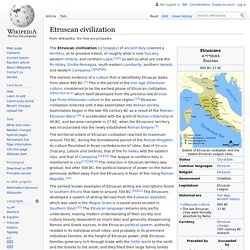
Mezentius. In Roman mythology, Mezentius was an Etruscan king, and father of Lausus.
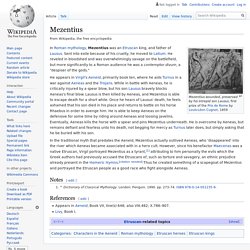
Sent into exile because of his cruelty, he moved to Latium. He reveled in bloodshed and was overwhelmingly savage on the battlefield, but more significantly to a Roman audience he was a contemptor divum, a "despiser of the gods. " He appears in Virgil's Aeneid, primarily book ten, where he aids Turnus in a war against Aeneas and the Trojans. While in battle with Aeneas, he is critically injured by a spear blow, but his son Lausus bravely blocks Aeneas's final blow. Lausus is then killed by Aeneas, and Mezentius is able to escape death for a short while. Rutuli. The Rutuli or Rutulians were an ancient people in Italy.
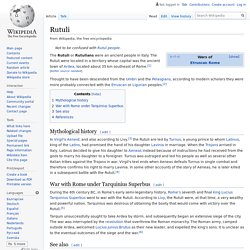
The Rutuli were located in a territory whose capital was the ancient town of Ardea, located about 35 km southeast of Rome.[1][better source needed] Thought to have been descended from the Umbri and the Pelasgians, according to modern scholars they were more probably connected with the Etruscan or Ligurian peoples.[2] Mythological history[edit] War with Rome under Tarquinius Superbus[edit] During the 6th century BC, in Rome's early semi-legendary history, Rome's seventh and final king Lucius Tarquinius Superbus went to war with the Rutuli. Tarquin unsuccessfully sought to take Ardea by storm, and subsequently began an extensive siege of the city. Turnus. Aeneas defeats Turnus, Luca Giordano, 1634–1705.
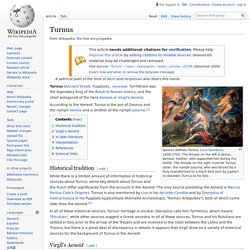
The female on the left is Venus, Aeneas' mother, who supported him during the battle. The female on the right must be Turnus' sister, the nymph Juturna, who was forced by a Fury (transformed to a black bird sent by Jupiter) to abandon Turnus to his fate. Turnus (Ancient Greek: Τυρρηνός, romanized: Tyrrhênós) was the legendary King of the Rutuli in Roman history, and the chief antagonist of the hero Aeneas in Virgil's Aeneid. According to the Aeneid, Turnus is the son of Daunus and the nymph Venilia and is brother of the nymph Juturna.[1] Historical tradition[edit] Lavinia. Lavinia at the Altar (ca. 1565) by Mirabello Cavalori, depicting the moment at which Lavinia's hair blazes as an omen of war but ultimate reconciliation In Roman mythology, Lavinia ( lə-VIN-ee-ə; Latin: Lāuīnĭa [laːˈwiːnɪ.a]) is the daughter of Latinus and Amata, and the last wife of Aeneas. Lavinia, the only child of the king and "ripe for marriage," had been courted by many men who hoped to become the king of Latium.[1] Turnus, ruler of the Rutuli, was the most likely of the suitors, having the favor of Queen Amata.[2] In Vergil's account, King Latinus is warned by his father Faunus in a dream oracle that his daughter is not to marry a Latin: "Propose no Latin alliance for your daughter Son of mine; distrust the bridal chamber Now prepared.
Men from abroad will come And be your sons by marriage. Blood so mingled Lifts our name starward. Not long after the dream oracle and the prophetic moment, Aeneas sends emissaries bearing several gifts for King Latinus. Latium. Abraham Ortel's 1595 map of ancient Latium The ancient language of the Latins, the tribespeople who occupied Latium, was the immediate predecessor of the Old Latin language, ancestor of Latin and the Romance languages. Latium has played an important role in history owing to its status as the host of the capital city of Rome, at one time the cultural and political centre of the Roman Empire. Consequently, Latium is home to celebrated works of art and architecture. Latinus. Mythical character Latinus (Latin: Latinus; Ancient Greek: Λατῖνος) was a figure in both Greek and Roman mythology.
He is often associated with the heroes of the Trojan War, namely Odysseus and Aeneas. Although his appearance in the Aeneid is irreconcilable with his appearance in Greek mythology, the two pictures are not so different that he cannot be seen as one character. Funeral games. Funeral games are athletic competitions held in honor of a recently deceased person.[1] The celebration of funeral games was common to a number of ancient civilizations. Athletics and games such as wrestling are depicted on Sumerian statues dating from approximately 2600 BC,[1] and funeral games are depicted in early Greek vases, such as the Francois vase at Florence and the Amphiaraus vase in Berlin.[2] In some accounts, funeral games were not merely held to honor the deceased, but in order to propitiate the spirits of those who had died.[3] Ancient Greece[edit] According to literary tradition, funeral games were a regular feature of Mycenean Greek society. Punic Wars. Series of three wars fought between Rome and Carthage from 264 BC to 146 BC Rome and Carthage possession changes during the Punic Wars Carthaginian possessions Roman possessions.
Jupiter. Fifth planet from the Sun in the Solar System Formation and migration Astronomers have discovered nearly 500 planetary systems with multiple planets. Regularly these systems include a few planets with masses several times greater than Earth's (super-Earths), orbiting closer to their star than Mercury is to the Sun, and sometimes also Jupiter-mass gas giants close to their star. Earth and its neighbor planets may have formed from fragments of planets after collisions with Jupiter destroyed those super-Earths near the Sun. As Jupiter came toward the inner Solar System, in what theorists call the grand tack hypothesis, gravitational tugs and pulls occurred causing a series of collisions between the super-Earths as their orbits began to overlap.[24] Researchers from Lund University found that Jupiter's migration went on for around 700,000 years, in a period approximately 2–3 million years after the celestial body started its life as an ice asteroid far from the sun.
Physical characteristics. Mercury. Mercury usually refers to: Mercury may also refer to: Arts and entertainment[edit] Dido. Aeneas recounting the Trojan War to Dido, a painting by Pierre-Narcisse Guérin. This scene is taken from Virgil's Aeneid, where Dido falls in love with, only to be left by, the Trojan hero Aeneas. Dido ( DY-doh; Ancient Greek: Δῑδώ, Latin pronunciation: [ˈdiːdoː]) was, according to ancient Greek and Roman sources, the founder and first queen of Carthage. Carthage. Archaeological site in Tunisia. Juno. Trapani. Comune in Sicily, Italy Trapani ( TRAH-pə-nee, Italian: [ˈtraːpani] ( Sicily. Di Penates. Lares. Lares ( LAIR-eez, LAY-reez,[1] Latin: [ˈlareːs]; archaic Lasēs, singular Lar) were guardian deities in ancient Roman religion.
Ascanius. Palinurus. Aeneads. Sergestus. Achates. Misenus. Ancient Rome. Italy. Aeneads. Justin. Gnaeus Pompeius Trogus. Quintus Fabius Pictor. Livy. Ab Urbe Condita Libri. Marcus Terentius Varro. Dionysius of Halicarnassus. Origines. Cato the Elder. Dictys Cretensis. Dares Phrygius. Gaius Julius Hyginus. Baucis and Philemon. Utnapishtim. Achilles. Poseidon. Pergamos, Cyprus. Argos. Diomedes. Apollo. Dardania. Deiphobus. Iliad. Nymph.
Phrygia. Mount Ida. Zeus. Homeric Hymns. Aphrodite. Dido and Aeneas. Dido and Aeneas Henry Purcell. Víðarr. Snorri Sturluson. Romulus and Remus. Virgil. Homer. Paris. Hector. Priam. Aphrodite. Anchises. Aeneas. Aeneas. Julius Caesar became dictator in 46 B.C.E. and was assassinated in 44 B.C.E. Virgil aeneid.